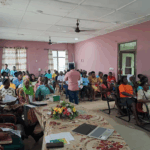
The Sekyere East District in the Ashanti Region has joined Ghana’s nationwide campaign to vaccinate young girls against the Human Papillomavirus (HPV), the virus that causes most cases of cervical cancer.
At a stakeholder meeting held in the district, health officials said the exercise aims to protect more than 6,000 girls aged between 9 and 14 years.
The campaign will use a single-dose approach, which has proven effective in preventing HPV infection.
Dr Justice Ofori-Amoah, the District Health Director, said the vaccination is crucial to saving lives.
“We are committed to ensuring every eligible child receives the HPV vaccine. Protecting our girls today means preventing cervical cancer in the future,” he stated.
District Disease Control Officer, Gideon Asare, explained that the health team will work closely with schools, community leaders, and healthcare providers to reach all eligible girls.
“We want this campaign to succeed, so we are engaging schools and community leaders. The single-dose vaccine is safe, effective, and life-saving,” he said.
The district has been conducting cervical cancer screening since August 2024. Out of 126 people tested, only one person was positive. Public Health Nurse, Nancy Osei Owusu, said this shows why vaccination is the best option.
“Screening helps us detect the virus, but prevention through vaccination is far better. It will protect thousands of girls before they are exposed,” she added.
Medical Officer in charge of Public Health at Effiduase Government Hospital, Dr Kingsley Adeoye, cautioned women to look out for possible warning signs of cervical cancer.
“Symptoms may include unusual vaginal bleeding, persistent pelvic pain, or abnormal discharge. These do not always mean HPV infection, but women should seek medical help immediately to rule out the condition,” he advised.
Globally, cervical cancer kills more than 350,000 women every year, according to the World Health Organisation.
In Ghana, the disease causes about 1,700 deaths annually, with nearly 3,000 new cases reported.
For Sekyere East, where access to advanced cancer treatment is limited, the vaccination campaign is seen as a life-saving step that could prevent many families from losing loved ones in the future.
